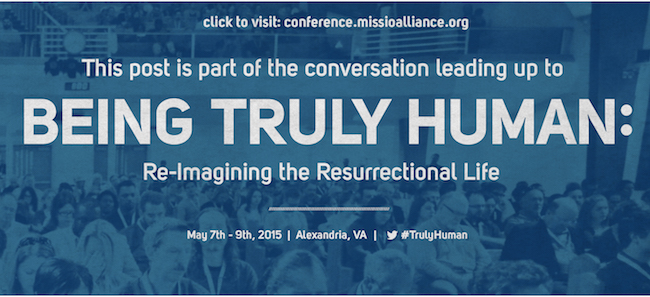A #TrulyHuman Realization: Raising a Racist Who Loves His Wife Well
This post originally appeared on Fred Liggin’s blog.
A thought came to me a few years back not soon after my son was born. You could say it was a moment when all my hopes and dreams crashed head-on with the reality of my faith as Jesus’ disciple and a pastor. At first all I could ask was, what kind of man would my son become? What kind of man will I raise him to be? At first the answers were obvious. I want him to be a good man, a hard worker who loves his wife and family well. Above all, I want him to love the Lord. But then it hit me. Maybe I can raise him to become a man who loves his wife well. Maybe he will see how much I adore his mama, how I respect and love her and how our marriage is rooted in mutual submission under the Lordship of King Jesus.
So, maybe I can raise him to love his wife in a way that honors God – but he could still grow up to be a racist.
 I was raised in south Georgia. Many people I knew had their prejudices and some were outright racist. As I’ve lived in different places I’ve met several professed Christians who, according to general Christian standards, are great husbands and wives – but are blatant racists. Or at the very least they openly look down upon, dehumanize, or degrade another person on the basis of socio-economic status or ethnicity.
I was raised in south Georgia. Many people I knew had their prejudices and some were outright racist. As I’ve lived in different places I’ve met several professed Christians who, according to general Christian standards, are great husbands and wives – but are blatant racists. Or at the very least they openly look down upon, dehumanize, or degrade another person on the basis of socio-economic status or ethnicity.
I’ve come to learn that as Christians we often aim for what I call the lower ethics of the kingdom. We focus on singular issues and build doctrines, preach sermons, and teach bible studies around them, treating them as though they are the primal ethic. We talk about raising “godly husbands” or “godly wives,” yet our children grow up loving their spouses while harboring disdain for their neighbor with a different accent or skin color. We talk about giving in terms of tithes and offerings, yet our children grow up accumulating so much stuff they have no financial capacity to give to people in need. We talk about being kind to others or doing unto others as we have them do unto us, yet our children grow up not giving a second thought to the death of another human being, especially in the context of crime and punishment or war.
There’s a story in Scripture when Jesus is confronted by religious leaders. For whatever reason they ask Jesus to boil their religion down to one major takeaway, you might even say, the highest truth and ethic of all. Jesus answers:
“He said to him, ‘Love the Lord your God with all your heart, with all your soul, and with all your mind. This is the greatest and most important command. The second is like it: Love your neighbor as yourself. All the Law and the Prophets depend on these two commands.’”
I’ve come to believe that even though these lower ethics are (obviously) important, to focus on them sets the trajectory of faithfulness too low – and fails to communicate the goal of becoming truly human in Christ. When we aim for these lower ethics we’re left with the difficult job of working our way up to the higher ethics, the truly human ethics, of loving our neighbor as ourselves. The godly husband has to be convinced of his racism. The faithful “tither” has to be convinced of her disdain for the poor. Now we have to position Christianity as a system of sin-management where we’re forced to deal with moralisms while having to squeeze in the gospel of King Jesus, versus the other way around.
 I can raise my son to be a great husband (I hope!) and he can still grow up a racist. Or I can raise him to love his neighbor as himself, and teach him that by neighbor Jesus includes his wife! I can redefine and broaden who our neighbors are, and show him what this looks like on a daily basis, including how I love his mama. I can teach him that loving God looks like loving others.
I can raise my son to be a great husband (I hope!) and he can still grow up a racist. Or I can raise him to love his neighbor as himself, and teach him that by neighbor Jesus includes his wife! I can redefine and broaden who our neighbors are, and show him what this looks like on a daily basis, including how I love his mama. I can teach him that loving God looks like loving others.
If my son sees what it looks like when I love God and neighbor I am giving him a fair shot of learning the lower ethics too. When he grows up, maybe he won’t have to be convinced of becoming a “godly husband.” Maybe he won’t have to be convinced that giving his time and money to God necessarily includes the people in need. Maybe he won’t have to be convinced that the death of another human being created in God’s image–a neighbor–no matter how evil they may be, breaks God’s heart and should be mourned, not celebrated.
Jesus says that ‘all the Law and the Prophets depend on these two commands.’ The apostle Paul seemed to believe this too. Faithfully set out to get this right and the other things have a better chance of aligning with God’s preferred future, and the truly human ethics of His kingdom.
Start by focusing somewhere else and, well, you’ll have more work to do and may end up proclaiming a love for God while harboring contempt in your heart for others.




